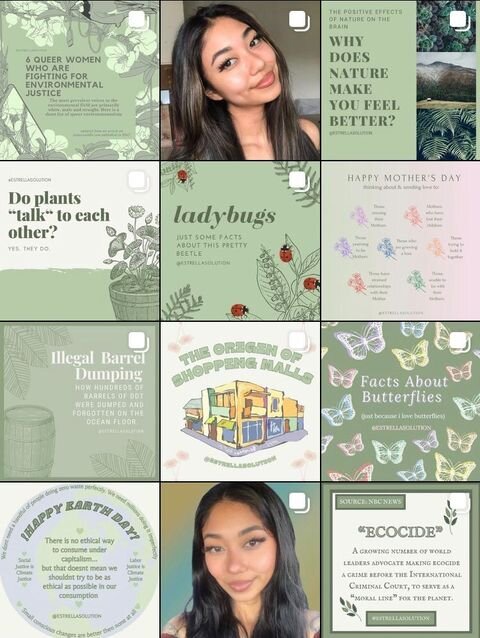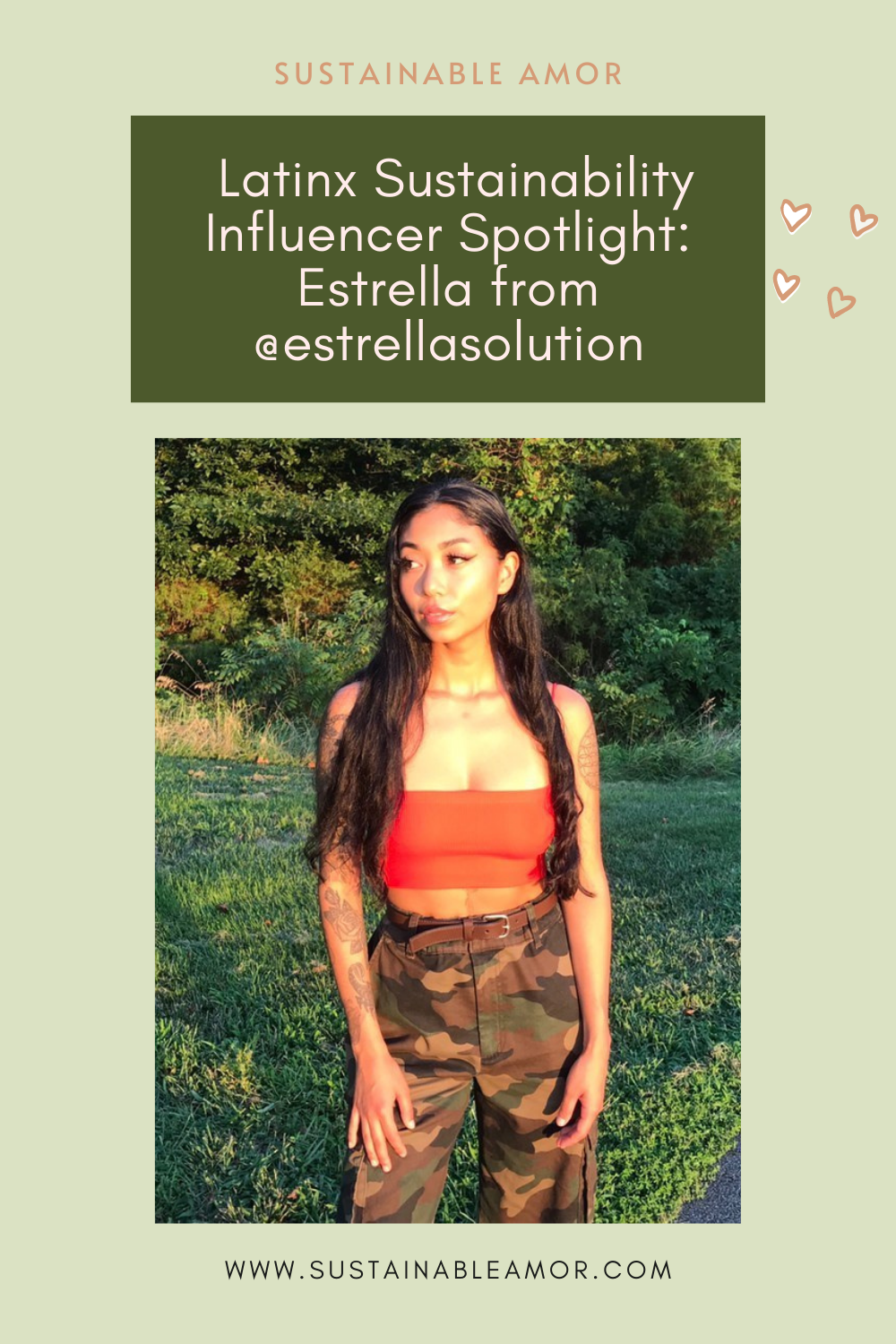Latinx Sustainability Influencer Spotlight: Estrella from @estrellasolution
Estrella (she/they/he) is a queer Okinawan Japanese and Mexican content creator that was born in Hawaii that is part of the sustainable fashion community through her Instagram, @estrellasolution. She loves to share what she knows and enjoys learning from others. She hopes that the content she shares helps combat environmental racism and save the planet. Learn more about Estrella and her take on sustainability!
What inspired you to start Estrella Solution in June 2020?
I graduated with my Bachelors in June, and originally made the Instagram account because I wanted to meet more people in the sustainability field! The more I learned and connected the more I realized how much I loved it, and wanted to keep using what I learned to help others.
How has being Okinawan Japanese and Mexican shaped your perspective on sustainability and green living?
I grew up in a tiny oasis of gardens in a small town and had a huge respect, love, and reverence for nature from a really young age. My Japanese mother had a compost pile and actively worked to reduce her waste, which she learned from her mother and family who were farmers during the Hawaii sugar plantation era.
I never realized how lucky I was to be surrounded by more sustainable thinking until I was older.
I think that growing up in Hawaii has affected me in terms of green living and sustainability more than my ethnic background. Hawaiians have a love and reverence for the land, and Hawaii residents (usually) follow suit. I realized the respect and care the people around me had for the land, and as I grew up, they instilled in me a protectiveness for the land and its natural resources.
Is it something you wished you had known about environmental justice when you were younger?
Literally everything. I am sure there are still things I need to learn now. To be quite honest, I wish I had learned about environmental justice in general. I learned about environmentalism when I was nine, but didn’t hear anything about environmental justice until I graduated from college.
Environmental justice should have come up LONG before then.
All the while, it is important to take into account the connection between poverty and racism, the effects of pollution, and micro-plastics on human health and development, and learning about how to support indigenous communities.
How can the Latinx community learn more about environmentalism and social issues?
As with all communities, I think it comes down to people within the communities wanting to care and accessibility to academic and verifiable sources. Teaching about the environment in schools would be helpful and translations into Spanish would help increase accessibility.
Why is it important that there be inclusivity and environmental justice in conversation around sustainability?
Quite simply, when inclusivity and environmental justice are not included in the conversation, people and situations will get left out.
All over the world, Indigenous communities have loved and cared for the land for millions of years. However, when the environmental movement began, there was virtually no mention of indigenous communities and their huge help and protection of their sacred lands.
In America, Black people, other minorities and people living in poverty have dealt with unfair environmental conditions and pollution from large corporations. These problems have historically not been noticed or acknowledged by the environmental movement because of their blind spots and focus on the animals and ecosystems. Humans are a part of the ecosystem too.
At the end of the day, everyone has blind spots. Blind spots can appear for each and every person, no matter how aware they appear to be. For environmentalists, their largest blind spot is focusing on the effects of humans on the earth without including how their actions affect other humans.
All humans have vastly different experiences, in their society and in their interactions with others. There are socioeconomic pressures that heavily affect their point of view. All points of views and experiences need to be included in opportunities and conversations so the discussions do not leave anyone out.
What are your top three eco tips for someone just learning about environmental living?
My top three eco tips are:
1. Learn as much as you can. Whether about the environmental movement in general, about greenwashing, or about sustainable sourcing♥️
2. Do as much as you can. Do not beat yourself up about things you cannot help♥️
3. Waste as little as possible! Most things can be recycled and reused. Buy quality items so they don't break as easily. Buy from thrift stores whenever possible ♥️
Bonus: Find mentors and a community that think similarly so you can learn from each other.
What advice do you have for someone just starting out in creating their own sustainable-oriented Instagram account?
Be consistent! Consistency is important to growing an audience of people who think similarly to you.
Focus on always learning! With environmentalism, there is always more to learn. There are always new studies and good or bad news out there.
Also, unlearning. New information may challenge what you already know or think and if you need to unlearn something
Take breaks and take care of yourself because social media is mentally taxing. Saving the earth can wait, so make sure to take care of yourself.
How do you think businesses can embrace more sustainable practices and policies across the board?
The most important thing is a market shift and a mindset shift. Businesses need to want sustainability and be willing to sacrifice some of their profits to save the planet. That way they will stop fighting tooth and nail against every environmental policy that is proposed. This seems like such a small thing, but many businesses simply do not care and it shows.
Heavy recycling regulations should be in place. Instead of fines, jail time should affect repeating offenders.
What is your vision for sustainable businesses in the future?
Ideally, a circular economy. Less plastics, more restrictions, more social programs, and better wages. Ethical sourcing should be a norm, plastic should be used extremely sparingly, if at all, and recycling regulations should exist. All the while, businesses would be set up for easy sustainable shopping.
Continue learning with Estrella by following her on social media!
AND look out for her website where she hopes to offer sustainable business consulting and businesses services through a sustainability lens.





